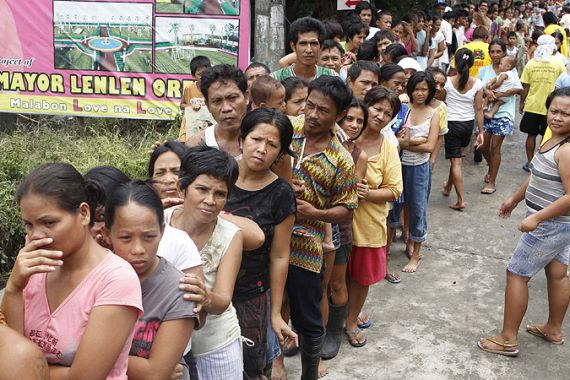Fears of disease as Philippines floods recede
Sanitation a major concern as government rushes doctors and emergency food aid to affected areas.

Emergency relief officials and doctors have been deployed to flood-devastated communities in the Philippines to prevent outbreaks of disease as the death toll jumped to 85.
While floods have gone down significantly around the capital, Manila, many areas in nearby provinces remained inundated as overflowing dams continued to release water, the national disaster co-ordinating agency said on Sunday.
Keep reading
list of 4 itemsAfter the Hurricane
World’s coral reefs face global bleaching crisis
Why is Germany maintaining economic ties with China?
“As the waters receded they left behind clogged pipelines and trash everywhere. Sanitation has emerged as a key problem,” Red Cross secretary general Gwendolyn Pang told the AFP news agency.
|
“We have deployed health officers in evacuation centres and in flood-hit communities with the likelihood of diseases erupting.“ – Gwendolyn Pang, Red Cross secretary general |
“We have deployed health officers in evacuation centres and in flood-hit communities with the likelihood of diseases erupting.”
The Red Cross put up huge rubber bladder tanks for clean water, while local officials sent portable latrines to packed evacuation centres.
The World Food Programme has begun to distribute tonnes of emergency food aid after the floods that affected more than two million people.
Food packs were also rushed to about 770,000 people displaced by the floods that submerged about 80 per cent of Manila last week.
Outbreak of disease
More than 441,000 people displaced by the floods are crammed into schools, gymnasiums, churches and other government-run makeshift evacuation centres, as forecasters say more rain is on the way.
Benito Ramos, the head of the civil defence office, said more than half were living in dire conditions in 948 evacuation centres.
“Many have returned to their homes as the waters subsided, but it is far from a normal situation,” Ramos said.
“We are trying to help them return to their normal lives with a massive clean-up operation. There is muck everywhere, and it would take some time.”
The health department said water purification tablets were being distributed, while mass immunisations were being carried out to prevent an outbreak of colds, flu and other diseases.
Of particular concern is a possible outbreak of leptospirosis, a bacterial disease caused by exposure to water contaminated by rat urine.
More than 3,300 people were infected and 249 died of the disease in the aftermath of similar flooding in 2009, the biggest casualty figure for leptospirosis in the world, health authorities said.